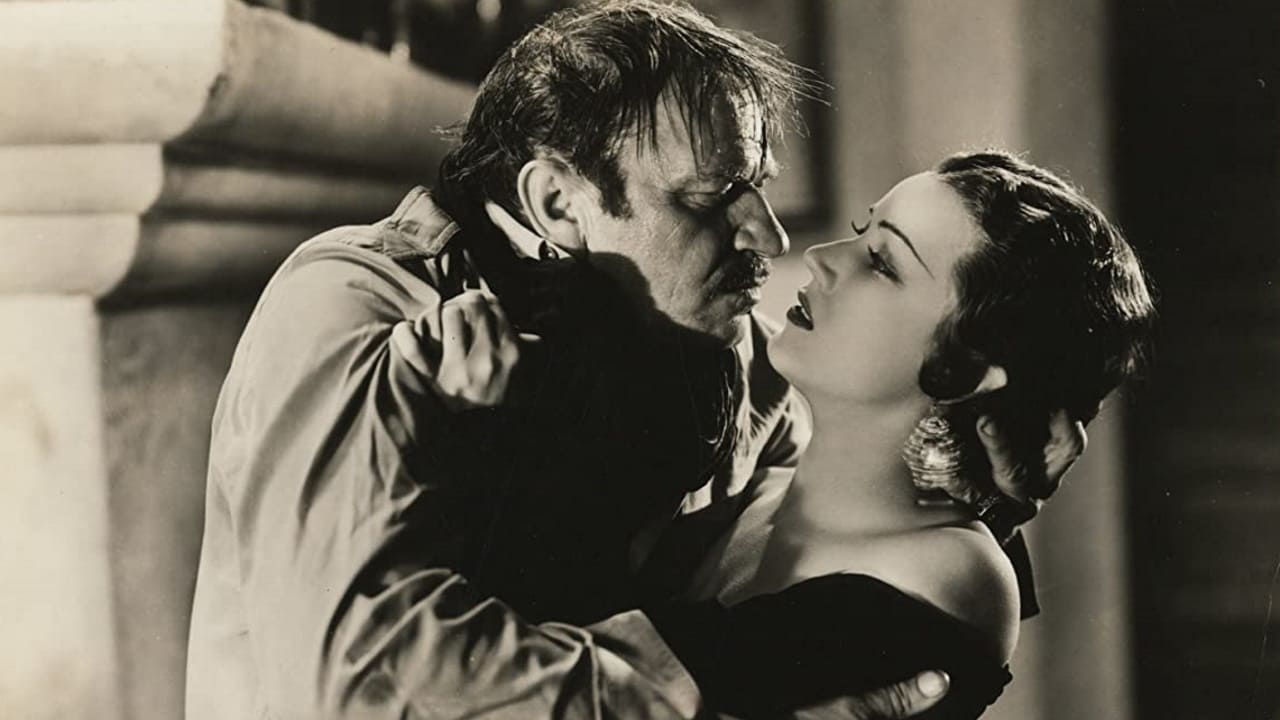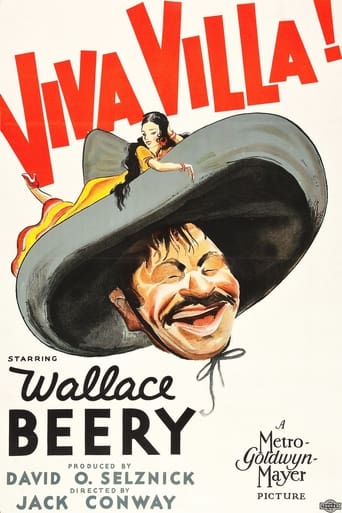Btexxamar
I like Black Panther, but I didn't like this movie.
Lollivan
It's the kind of movie you'll want to see a second time with someone who hasn't seen it yet, to remember what it was like to watch it for the first time.
Erica Derrick
By the time the dramatic fireworks start popping off, each one feels earned.
Brooklynn
There's a more than satisfactory amount of boom-boom in the movie's trim running time.
donutme
Despite the beautiful scenery of and camera work capturing old Mexico, this is one of the worst movies I've ever seen. Pancho Villa does not for one minute look heroic in this movie, but instead comes off as a childlike buffoon with the inability to put two sentences together without bumbling with his words. I would never recommend this film to anyone. I understand that this was a different era in Hollywood, but this is why we still have English accents in all the Roman/Greek "gladiator" films and television shows. Some things in Hollywood don't seem to change. Hearing any actor trying to speak English with a "Spanish" accent, but with the old world Shakespearean classic "English" delivery is almost painful to my ears. "Oh... have I missed the execution?" Just horrible Hollywood, horrible. I wanted to see this movie, hoping that it would have some historical value to it. To give me a better insight to the life of Villa, and all I could sum up was that Wallace Beery's performance was better suited for an "Our Gang" short, where the kids were getting the better of this lummox. I kept expecting Spanky or Buckwheat to appear any moment throughout the film with the almost comedic delivery of this Mexican hero/bandit.Sadly, this movie would probably popular with college kids as one of those "drinking game" movies. Drink every time Villa says "Shut up" or the word "uh". Yeah, Pancho Villa the warlord, represented to the finest. Or when one of the Mexicans spoke and you couldn't tell if it was Shakespeare or not. And to find out that this movie won several awards... no, just no.
Spondonman
Viva Villa!, and its bookend film Treasure Island made just afterwards by Wallace Beery are two of my favourite fiction films from the Golden Age of Hollywood action and adventure. Both are tour-de-force performances by the inimitable Beery, and although chockful of thrills and spills the main entertainment value lies in Beery's screen persona.Story purports to relate the meteoric rise and eventual sideways move of Pancho Villa, Mexican rebel, patriot, murdering raping thug in his quest to give the land back to the peons which had been violently taken from them years before by the arrogant aristocracy. He has a childlike trust in Madero the benign statesman who is almost deified by the movie, and has constant assistance from Sierra played by Leo Carillo, his psychotic sidekick. Fay Wray got a couple of appearances in but some of her scenes were apparently cut when the Hays Code came into force. Based on fact and fiction it's an entertaining ride - yet another Revolution Betrayed, episodic because of production problems they had but always engrossing if you can get over the technical limitations (mainly dodgy back projection).But it's Beery's performance that's so breath-taking: as a real-life dislikable person he successfully plays a thoroughly dislikable swine (and in Treasure Island, too) as a lovable overgrown simple child, except he'd like to try pulling the legs off soldiers instead. You root for him all the way throughout his murderous career, go misty eyed when he does, agree with every cause of his anger. The pathos he introduces at various points in the tale is indescribable and unique – and it's made clear that everyone loves him, except for Fay Wray's character and her brother played by that marvellous wooden actor Don Cook. Some favourite bits: defending his savage tactics to Madero: "You can't win a revolution with Love, you've got to have Hate"; letting embedded journalist Johnny have his way and deciding on a whim to take Santa Rosalia; the telegram from Pancho to Madero stating "nobody killed much" in taking Juarez; Johnny's summation to Pancho "you're better than News, you're History"; Pancho's tearful last orders to his troops; telling a disgusted Cook "Alright. The poor always was the Beast. Only this time we're not frightened"; the thought of the method of execution of General Pasquale; being fed his dying words "Forgive me? Johnny…what I done wrong?", childlike to the end and playing on your heartstrings to a stirring musical score; so many more.The subject history is a bit sketchy so if for no other reason watch this for Beery - to my mind this and Treasure Island are his best performances - not a great actor but in here he's wondrous to behold. The power of film is frightening.
bkoganbing
I'm still not clear on how MGM got away with this film. Pancho Villa had only been dead for 10 years and his famous raid on Columbus, New Mexico almost 20 years. Surely not enough time for people to have forgotten Villa or what he did.But the most famous thing he did, raid into the USA and provide a pretext for intervention into Mexican affairs, is completely forgotten by this film. The Villa we see here is a lovable lug of a guy, a typical Wallace Beery part who gets his social conscience awakened by Francisco Madero and gives up banditry to become a revolutionary.If you're a big fan of Wallace Beery and liked him in such films as Min and Bill and Treasure Island than Viva Villa is simply an extension of the characters he played there. Actually I think the most interesting character in the film is that of Francisco Madero. Henry B. Walthall's performance is the best and I wish Walthall had starred in a film where he was the central character. Madero was as you see in the film a man of high ideals, betrayed and assassinated by his supporters. But it was hardly Pancho Villa who took vengeance on his betrayers. After long time Mexican dictator Porfirio Diaz was overthrown in 1911 and then Madero assassinated in 1912, Mexico fell apart much like the former Yugoslavia did almost 20 years ago. Civil war raged there for a generation. Eventually it united under the PRI party which elected all of its presidents until Vicente Fox.I've never really liked this film, it stray so far from the facts it's laughable. The players go through their familiar roles and it's a good cast that Howard Hawks later Jack Conway put through their paces. Of course the most famous story coming out of this film is about Lee Tracy getting blotto and going out on a balcony and raining on some Mexican soldiers. Got him fired from the film and Stu Erwin got the break and Tracy's part as the newspaper reporter who popularizes Villa.If in fact you consider it a break Erwin got to be in Viva Villa.
theowinthrop
Wallace Beery was a complicated man. He was (from what I have read of him) a nasty customer in many ways - he skirted the edge of the law on several occasions. But he was an entertaining performer, in both drama (CHINA SEAS, THE CHAMP) or comedy (DINNER AT EIGHT, A DATE WITH JUDY). Although his Oscar (in the first tie vote in Academy history - with Fredric March in DR. JECKYL AND MR. HYDE) was for THE CHAMP, in some ways his most sympathetic role was as Pancho Villa in VIVA VILLA.It is rather curious that this film, the first really serious sound film to study the Mexican Revolution, picked up on Villa as the hero, rather than Francisco Madero, the original leader of the revolution in 1910. Madero appears in the film (played by Henry B. Walthall, in a good performance), but it is Villa's story (or what passes for it). He was more colorful than the unfortunate Madero, now best recalled for his murder in 1913 by General Huerta. Villa was a highly successful bandit (a model for Alfonso Badoya's great bandit in THE TREASURE OF SIERRA MADRES), who did support some amount of social reform for the lower classes - but he never was as committed to it as his southern rival Zapata. In fact, when Villa finally ended fighting the government, he retired to a large landed estate he had acquired.But he had great color...for good or bad. On one occasion he was giving an interview to a newspaperman, when he noted a drunken soldier who was making too much noise, so that he could not hear the newsman's questions. Quietly, without looking vicious or nasty, Villa took out his gun and shot and killed the soldier. He then resumed the interview with the horrified newsman. Villa was like that. He considered his killing someone like that natural. He was an odd man, very childlike at times, very cunning (to a point rather clever as a military strategist), and highly murderous when angered. He loved women, and would "marry" many to satisfy their scruples if they hesitated having sex with him. This led Theodore Roosevelt to make the rather loopy comment that Villa was an evil murderer and bigamist.Villa was also the last man in history (prior to Osama Ben Laden's tools) to attack the continental United States. Angered that President Woodrow Wilson stopped supporting him and his men in 1916, Villa attacked Columbus, New Mexico, killing several Americans. The failure of the Carranza government to arrest or catch Villa led Wilson to blunder into Mexican affairs by sending General John Pershing and a large armed force into northern Mexico to catch Villa. Villa led Pershing a merry chase, and finally the Americans had to withdraw in humiliation. Actually that was his highpoint as a public figure. Within two years his army was in ruins and he had to surrender to the government forces. He retired to his ranch, only to be assassinated by personal enemies in 1923.Beery was not the only actor to play Villa. Yul Brynner and Telly Savalas both played the role in films too. But the Beery film is best in making the Mexican into a tragic hero. He is an overgrown child, who needs a father figure to bring out his best side (briefly found in Madero), and does not fully know when he does wrong. But he also has a sense of right and wrong: witness his willingness to humiliate himself before his enemy General Pascal (Joseph Schildkraut), to save lives - only to find that Madero has pardoned him already. Later, when he learns that Madero was betrayed and murdered by Pascal, he captures the General and gives the latter a brutal punishment, but one that the audience fully supports.His friendship with the John Reed character (Stu Erwin as Johnny Sykes) shows that he was capable of being a more reasonable man, but was troubled by his behavior and his failures. He never did fully deliver the reforms to Mexico that he had pledged Madero he would bring. In the end, as he lays dying, Sykes is there to comfort him - telling him how Mexico will honor his memory. But he dies crying the line in the "summary" line above - what had he done wrong indeed!Not the historic Villa, but a worthy portrait of a fascinating man.

